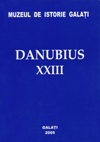Unitatea românească în „secolul fanariot”. Mit sau realitate istorică?
The Romanian unity during the Phanariot century. Myth or historical reality?
Author(s): Claudiu NeagoeSubject(s): History
Published by: Muzeul de Istorie „Paul Păltănea” Galaţi
Summary/Abstract: One of the highly-debated issues of the historiography from the XXth century was the “unity of Romanians” along the centuries. Since the foundation of the Romanian medieval states (XIVth century) until the beginning of the Modern Age (XIXth century), the idea of unity had been expressed in various ways: we can speak, firstly, of a “political and military unity”, prompted by the solidarity before the Ottoman threat during the XIVth and the XVth centuries, then of a “dynastic unity”, during the XVIth and the XVIIth centuries, and of a “political unity”, during the XVIIIth century, and this only considering the Romanian cultural policies, without the influence of the European Illuminist ideas. In fact, this political unity of the Romanians inhabiting the Danubian Principalities during the XVIIIth century and their common claims regarding the restoration of the old “privileges” mentioned in the “treaties” concluded with the Ottomans – internal autonomy, autochthonous prince on the Romanian throne, limitation of the economic demands – led to the cessation of the abuses of the great Ottoman dignitaries. If, in the external politics, our boyars and intellectuals were dynamic and reforming, in internal affairs, they proved to be conservatory and traditionalist. A series of “memoirs” addressed to the Great European Powers brought the difficult situation of the Romanian countries to the attention of the European public opinion. In this manner, they managed to sensitize the Great Powers of Europe, Austria, Prussia, Russia and, especially, France; all these countries impelled the Ottomans to restore those old “privileges” of the princes reigning in Moldavia and Wallachia. Moreover, the changes in the balance of powers in the South-Eastern Europe and the mutations which occurred at the level of European ideas and mentalities shattered the Romanians from the passivity and resignation that had been their refuge for almost a century and brought them to fight for a change in their destiny.
Journal: Danubius
- Issue Year: XXIII/2005
- Issue No: 1
- Page Range: 73-80
- Page Count: 8
- Language: Romanian

